Three-Wheeler Threeway
Two tilters and a fixie: Piaggio MP3, Tilting Motor Works Trio, Can-Am Spyder F3-T
Five years ago this month MO reported that Bombardier Recreational Products had filed a patent as far back as 2009 for a control system that’d allow the Can-Am Spyder to lean. Later that same year it came to light that Harley-Davidson had been developing a similar tilting three-wheeler ( the Penster) for years before scrapping the project and moving in a more traditional-trike direction with the Tri-Glide and recently introduced Freewheeler. Well, guess what? The leaning reverse trike charge isn’t being led or financed by BRP or H-D and their incredibly deep pockets. At the vanguard of the full-size tilting trike revolution is a lone engineer in a garage somewhere in Snohomish, WA.
Yes, Honda displayed the leaning, reverse-trike Neowing at last year’s Tokyo Motor Show, but it’s only a prototype. And, yes, Piaggio’s MP3 has been available since 2006, and Yamaha’s Tricity was released last year in Europe (a model for which Yamaha is being sued by Piaggio for copyright infringement), but these are scooters. The Tilting Motor Works Trio is constructed for full-size Harleys: Road King, Road Glide, Street Glide, Electra Glide, Softails, Dynas, Sportsters, V-Rods, and Hondas: Gold Wing, Valkyrie, F6B.
Polaris Slingshot Vs. Can-Am Spyder F3-S Vs. Morgan 3 Wheeler
The TMW Trio is the brainchild of Bob Mighell. An engineer and motorcyclist, Mighell put metal to grinder a handful of years ago and transformed an inexpensive Honda Rebel into a prototype leaning tricycle. In 2012, Mighell took to the salt of Bonneville with a slightly more powerful version of his original test mule. The 1197cc V-Max V-4 propelled Mighell to 132.245 mph, breaking the land speed record for three-wheeled motorcycles by more than 10 mph. Perfecting his design since Mighell is now busy enlisting dealerships to install and service his unique reverse-trike kit.
“I find it amazing that an individual’s creative mind can come up with such a functional setup where the major manufacturers haven’t,” says editor Evans Brasfield. “The Trio delivers motorcycle-like handling on a full-sized converted motorcycle.”
Yamaha Teases New Three-Wheeled Vehicle
Like the Piaggio MP3 we brought along, the most important aspect of the Trio’s design is its ability to lean. In fact, the Trio is perfectly comfortable scraping its floorboards while rounding corners. The Trio’s handling is familiarly motorcycle-ish, but two wheels up front, tracking independently of one another, provides foreign feedback through the handlebars.“Although the Trio is doing all the right things when you countersteer, the way the handlebar turns into the corner is initially disconcerting, giving an experienced motorcyclist contradictory sensations,” says Brasfield.
“Although the Trio is doing all the right things when you countersteer, the way the handlebar turns into the corner is initially disconcerting, giving an experienced motorcyclist contradictory sensations,” says Brasfield.
EiC, Kevin Duke elaborates, “While the titling MP3 responds almost exactly like a heavy scooter, the Trio feels like a cross between a motorcycle and an ATV. It reacts to a firm shove on the inside bar, countersteering like a heavy motorcycle, but the handlebar then turns into the curve like a quad. It’s an odd sensation that feels less strange the longer it’s ridden.”
Of the three, the MP3’s handling is most similar to that of a two-wheeler. “From the moment I lifted my feet off the ground, the MP3 felt like a motorcycle, not a reverse trike,” says Brasfield. “The steering, while maybe a bit heavy for a scooter, was responsive and predictable. The chassis responded like a motorcycle to steering and cornering forces.”
The non-leaning Spyder feels the most foreign. “The Spyder feels what I imagine a snowmobile fitted with wheels and tires would feel like, with an aggressive rider flopping his body to the inside of corners to optimize weight distribution,” says Duke.
Preceding our ride day, SoCal was hammered by El Nino rains, resulting in gravel-strewn apexes of seemingly every blind corner. If testing two-wheelers was the task at hand, trepidation, and slower speeds would have prevailed, but with two points of contact up front on the Trio, MP3, and Can-Am Spyder F3-T, we flouted these pitfalls with a smirk and fistful of throttle. When braking was in order, the extra grip and stopping power felt like wire walking with a safety net, where a motorcycle is always a front-end slide away from disaster.
The Spyder’s brakes are especially robust. With only a foot pedal activating both front and rear binders, and ABS operating in the background, a rider can haul speeds down from scary fast to a reasonable pace in an easily manageable manner. Producing a claimed 115 horsepower and 96 lb-ft of torque from its 1330cc inline-Triple, the Spyder definitely requires this kind of stopping power. The MP3 is also equipped with ABS, but its 500cc Single doesn’t accelerate you through time and space with the same urgency of the Spyder.
2016 Can-Am Spyder F3-T First Ride Review
Our Trio was configured to a Harley-Davidson Softail with more power than the MP3 but not nearly as much as the Spyder. For those desiring a more ebullient experience, customers can choose to mount the TMW front end to a Honda Gold Wing, Valkyrie or F6B with Honda’s 1832cc horizontally opposed six-cylinder producing around 103 hp and 109 lb-ft of torque (we requested that Bob bring one of these models to our next test session).
“The Harley Trio we tested preferred a cruiser-sedate riding pace on a winding road,” explains Brasfield. “Try to enter a corner too quickly, and you’ll hear the front tires protest, but that is largely a factor of us putting the machinery through our extra-aggressive testing regimen.The typical cruiser/Trio rider should find the performance limits more than adequate.”
Adjustable front shocks would certainly go a long way in helping to up the Trio’s sporting prowess. Mighell says fully-adjustable suspension will likely be an optional upgrade. For now, the Trios will come outfitted with purpose-built, non-adjustable Progressive shocks. Front-end feedback is best on the MP3, due to its more narrowly spaced wheels and more conventional suspension.
At around 600 pounds fueled the MP3 certainly cannot be considered light – especially for a scooter – but it’s easily the lightest of this bunch. Harley claims around 755 pounds for a running Heritage Softail, then add another 100 pounds which is what Mighell tells us is the approximate weight increase of the Trio kit. The Spyder F3-T is the heavyweight of the bunch tipping the scales right around 1,000 pounds.
“The F3-T is my favorite Spyder yet,” says Duke. “I think it looks sharp, and I can appreciate how it could be an attractive alternative for a touring machine for the right rider. The seat treats butts gently, storage is plentiful, it’s easy for almost anyone to ride, and it’s all but impossible to tip over. The absence of a clutch lever and foot shifter requires some acclimatization, but it all works pretty seamlessly once a rider learns the proper procedures.”
One of the most limiting factors of the Trio is its inability to make a sharp U-turn. The forthcoming TiltLock system won’t solve the issue, but it will ratchet down the intimidation factor of U-turns and other slow, parking-lot-type maneuvers.
“You can tell this isn’t a vehicle produced by a major OEM by its odd steering responses and ship-length turning radius,” says Duke. The Spyder also requires a wide berth when making U-turns, but then it also has reverse, which can be a real lifesaver in tight situations.
From a nimble, affordable scooter, to a leaning Harley-Davidson and non-leaning Spyder, these three reverse trikes represent the diversity of available tricycles. Others exist such as the Polaris Slingshot, Campagna T-Rex, Morgan 3 Wheeler, to traditional trikes like the H-D Freewheeler, or sidecar rigs like Ural’s Gear-Up. While each offers its own version three-wheeled motorcycling, we hope the to see more leaning versions such as the Trio and MP3. If Yamaha and Honda have anything to say about it, we should be enjoying some new leaning toys in the near future, and that’s exciting!
A former Motorcycle.com staffer who has gone on to greener pastures, Tom Roderick still can't get the motorcycle bug out of his system. And honestly, we still miss having him around. Tom is now a regular freelance writer and tester for Motorcycle.com when his schedule allows, and his experience, riding ability, writing talent, and quick wit are still a joy to have – even if we don't get to experience it as much as we used to.
More by Tom Roderick



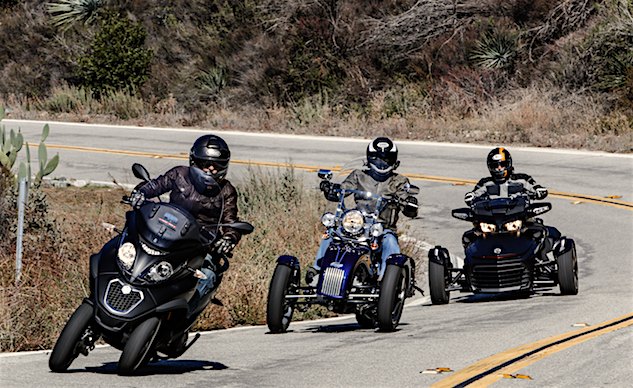
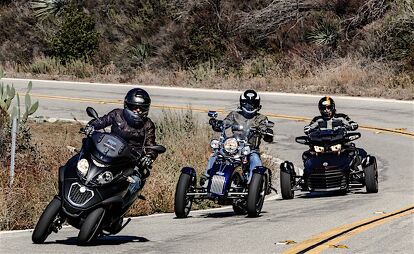















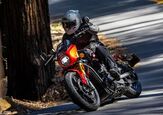
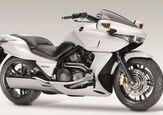
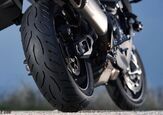
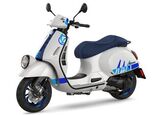
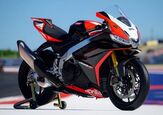
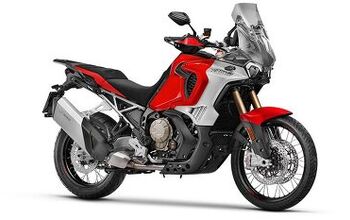
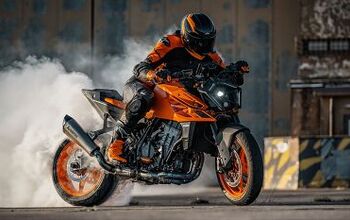
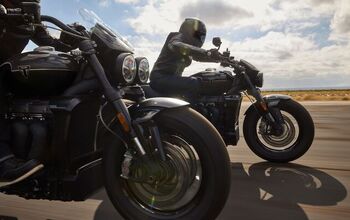
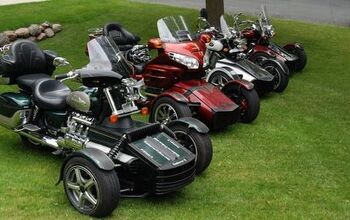
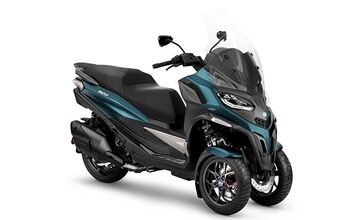
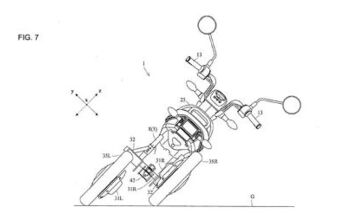
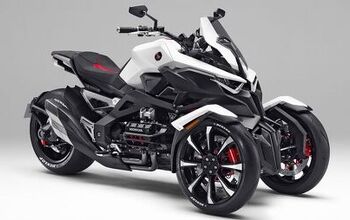
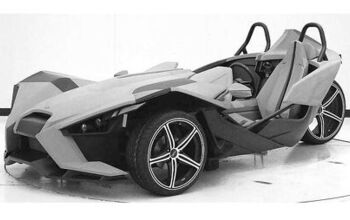
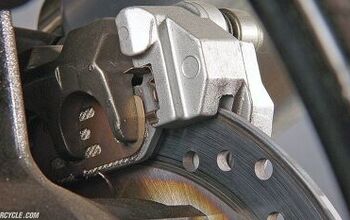
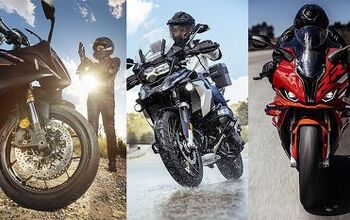
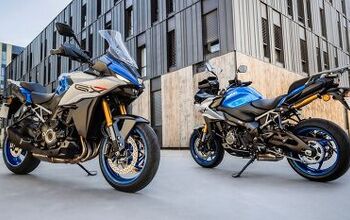
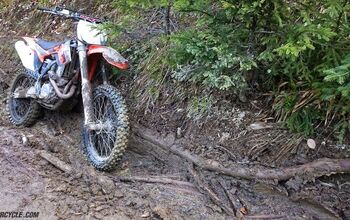
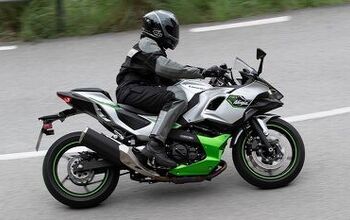
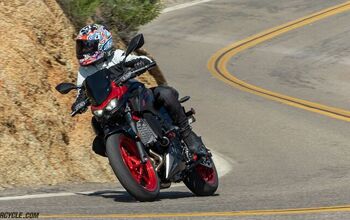

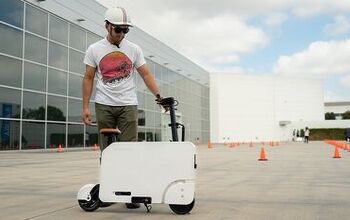

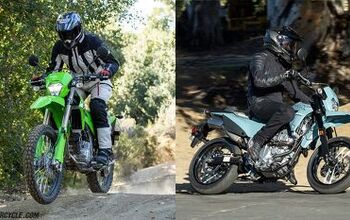
Comments
Join the conversation
I just wanted to let you know that the Gold Wing Trio looks terrible. That retro-rod grille thing on the front looks good on a Harley or some other cruiser, but out of place and horrifying on Honda styles. Maybe get a V-Rod Trio if you want something more powerful?
I used to ride a MP3 in Oslo, Norway. I can tell you, @kevin_duke:disqus , if you ride in european cities with cobbles and trams you will need traction control.
By far the most practical way to motor in a city. I even got a full pizza under the seat!
The MP3 should be the most sold bike in american cities like San Fransisco. With the front lock, you could park it anywhere.